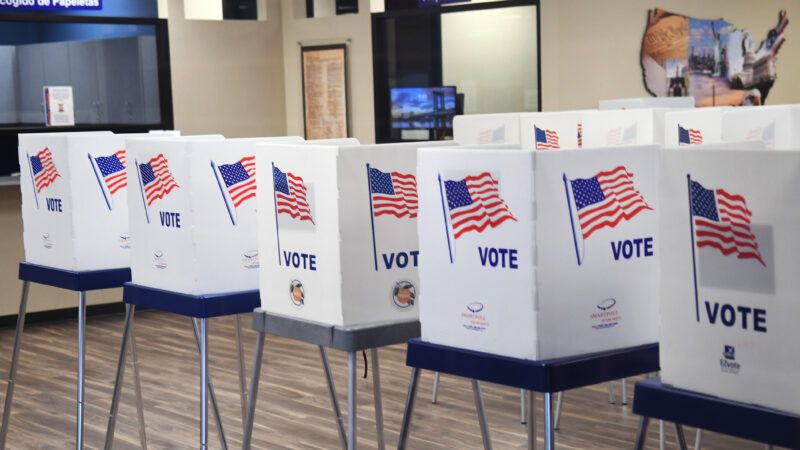Florida's Constitutional Revision Commission Is Unelected, Unaccountable, and Unnecessary
This November, voters will have the chance to abolish it. They should.

On November 8, Floridians will have the unique opportunity to vote on a constitutional amendment that would abolish a commission that proposes constitutional amendments.
Amendment 2 proposes abolishing the state's Constitution Revision Commission (CRC), a 37-member body that meets every 20 years to review and propose changes to the Florida Constitution. While the commission's creation and purpose seem well-intentioned, it doesn't seem to be working as planned.
Prior to 1968, when the state was still under the Constitution of 1885, amendments to the document could only be proposed and placed on the ballot through the Legislature. Legislative seats were severely malapportioned as the state struggled to keep up with its growing population, and voters—especially in South Florida—didn't feel that they were adequately represented. After the U.S. Supreme Court ordered Florida to redraw district lines and urban voters gained more representation, a new constitution was proposed in 1968 that provided four ways for voters to propose constitutional amendments: by a legislative joint resolution, by holding a constitutional convention, by citizens' initiative, or by a recurring revision commission. Thus, the Florida CRC was born. It was—and still is—the only automatically recurring constitutional revision commission in the United States.
The CRC has met three times since its creation: in 1977, 1997, and 2017, with its next meeting set for 2037. Fifteen of the 37 commissioners are appointed by the governor at the time, nine are appointed by the state Senate president, nine more are appointed by the speaker of the state House of Representatives, and three are appointed by the chief justice of the Florida Supreme Court. The state attorney general is also a member of the CRC. The commission reviews proposals submitted by both the public and its own members. Proposals must pass two rounds of votes in order to reach the ballot.
Opponents of Amendment 2 argue that the CRC provides voters with an additional way to make their voices heard and be involved in the constitutional revision process. Indeed, it did approve multiple ballot measures in its 2017 session that were popular with voters in the 2018 elections.
But other measures the CRC approved that same year proved problematic. "In an attempt to avoid 'voter fatigue,' the CRC decided to package what started as some 20 or so proposals into just seven initiatives," Reason's Christian Britschgi wrote in 2018 when the commission asked voters to ban offshore drilling and vaping in offices in a single ballot question.
The commission has developed a reputation for lumping several unrelated issues into the same ballot question. Making it difficult for Floridians to understand what they're voting on—and forcing them to vote on multiple issues bundled into one ballot question—seems to defeat the commission's purpose of empowering democracy and civic involvement.
It's also easy to see how the CRC's composition of unelected, unaccountable officials can weigh constitutional decisions in one party's favor depending on the decade.
"It's rediscovered every 20yrs, has no rules, players have no experience, once it starts it can't stop, crazy things pop out, and you never know how damaging they will be. Election night, you yell 'Jumanji,'" state Sen. Jeff Brandes (R–St. Petersburg), who introduced Amendment 2, tweeted.
"Most of the issues people bring to the CRC each time it convenes are legislative issues they are frustrated the legislature has not addressed," wrote Adrian Moore, vice president of policy for Reason Foundation, the nonprofit that publishes this website. "Lacking a direct democracy mechanism to change the law, they take the only route they have, addressing the issue via the state constitution." This defect allows the Florida Constitution, which has been amended 144 times, to be "full of 'issues of the day' rather than timeless rights and rules for the state."
Abolishing the CRC wouldn't have much of a fiscal impact, Moore writes. But it would eliminate one possible mechanism for unelected officials, possibly all of the same party, to decide for themselves what constitutional amendments should be placed on the ballot.
If Amendment 2 passes, Floridians would still be able to propose and vote on changes to the state constitution in the same ways citizens of almost every other state can: legislative referendums, constitutional conventions, and citizens' initiatives. Plus, Florida has yet another commission that can refer amendments to voters: the Florida Taxation and Budget Reform Commission.
But if Amendment 2 doesn't pass, reform is another option for Floridians, and there is ample time for that before the commission meets again in 2037. Moore suggests the creation of a "citizen legislative initiative process where Floridians could vote on legislative changes, not just changes to the state constitution…A constitutional amendment to create a citizen legislative initiative process and require the CRC to focus on issues appropriate to address in the constitution would both improve the CRC process and answer many of its critics and give citizens a more appropriate outlet for change."


Show Comments (42)